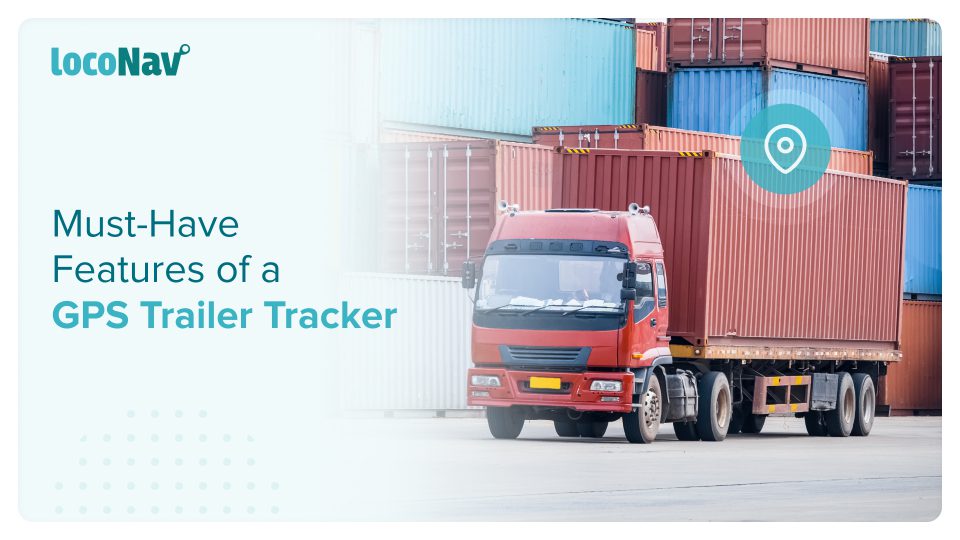

Trailers exist in a variety of sizes and configurations, ranging from motorised, completely contained refrigerated trailers to non-powered flatbed trailers and more. It is critical to choose a flexible GPS trailer tracker that is tough enough to resist harsh weather and has its own power supply for when the trailer is removed.
GPS trailer tracking provides your trailer fleet with real-time location data. You can use this data to connect with drivers on the road and provide clients with status updates.
GPS trailer monitoring systems can give you vehicle location updates as regularly as every two minutes while your trailers are running. GPS trailer tracking benefits your fleet in a variety of ways, whether your trailer is on the road or in the parking lot.
Get Government Approved AIS 140 devices
What to Look for in a GPS Trailer Tracking Device?
- Reporting Capabilities
The magic ingredient of GPS trailer tracking, like fleet tracking, is reporting and analytics. From usage data to detention cost reports, knowing how, when, and where your trailers are being used in real-time is critical to profitability. Solutions like LocoNav offer many predefined and custom reports that you can use to make the most of your fleet data. They allow you to derive actionable insights and significantly improve fleet performance.
- Geofencing
Geofencing is critical for trailer tracking, particularly with non-powered assets. Users can set up a geofence to receive fast alerts when a trailer enters or exits a defined region, reducing unwanted use and theft. With LocoNav geofence alerts, you can ensure that the right employees are notified via their preferred or most responsive mode of communication.
- Alerts
You may wish to know when a trailer is moving or if it is moving when it should not be. A competent GPS trailer tracking system will provide both on-road and off-road notifications. Look for power disconnect notifications as well, so you know when a vehicle has been unplugged from a trailer. LocoNav offers many customizable alerts that are delivered to you 24*7. You can also choose to only receive critical alerts to reduce unnecessary noise created by insignificant notifications.
- Maintenance Capabilities
It might be difficult to identify if and when a trailer needs maintenance or other servicing without an odometer or other engine diagnostics. The correct trailer tracking system will record utilization and mileage as well as assist in keeping maintenance logs up to date and the trailer completely optimised for its purpose.
- Scalability
A capable trailer tracking solution expands with your company. LocoNav’s GPS Trailer Tracking Solutions are fully scalable. LocoNav is perfect for all fleet sizes, whether you operate 10 vehicles or 1000, and if you want to take your fleet from 0 to 100.
Why is Real-Time Trailer Tracking Needed?
Trailer tracking systems must provide fleets with real-time location information. Real-time alerts keep a check on unauthorized vehicle access and allow for a more proactive response in terms of vehicle theft.
Fleet managers can choose to be alerted via instant alerts at predetermined times. This level of visibility is often sufficient, particularly for an unpiloted trailer or asset. However, in some circumstances, such as theft or unauthorised use, locating a trailer as soon as feasible is crucial. This is where geofence alerts can come in handy for fleets.
Fleet may additionally decide who receives an alert and how they receive it (email or SMS) with LocoNav’s geofence alerts, ensuring that the right employees are notified via their preferred or most responsive mode of communication.
What are the Different Types of Trailers you Should Monitor?
Here are the different types of commonly operated trailers that can be monitored using a GPS Trailer Tracking Device:
- Flatbed Trailer
One of the most prevalent trailer types is the flatbed trailer. These trailers can transport everything from steel coils to logs. It is an open container, which means there are no confining boxes to protect the contents being transported.
- Dry Vans
Dry vans, sometimes known as enclosed trailers, are flatbeds with a box around them. These are waterproof options for storing the load in a dry location. Dry vans are commonly used by grocery stores to ship items such as clothing, gadgets, and food.
- Lowboy Trailers
Lowboy trailers are a beast of a choice for moving heavy loads that are taller than the allowable trailer height. These are frequently used for heavy-duty construction machinery.
- Step Deck Trailers
Step deck trailers and flatbed trailers are very similar. The sole difference is that a step-deck trailer has a maximum freight height of 10 feet. They are intended to transport items that flatbed trailers cannot.
- Refrigerated Trailers
Refrigerated trailers are essentially dry vehicles that have been insulated. They have a cooling system in place to keep the commodities fresh. This trailer is mostly used for frozen items. Pharmaceuticals are occasionally carried in reefers.
- Extendable Flatbed Trailers
These trailers are just as advertised. They are flatbeds with lengths ranging from 43 to 80 feet. The extended flatbed trailers are designed to accommodate lengthy loads, so there is no need to worry about the weight hanging off the trailer’s edge.
- Multi Car Trailers
These trailers are so ubiquitous that they must be mentioned. They are officially specialist carriers, with different restrictions depending on the state. They can transport two to eight vehicles anywhere. The driver will triple-check that the vehicles remain in position for the voyage once they are loaded onto the trailer.
- Extendable Double Drop Trailers
Extendable double drop trailers are employed to transport objects that are substantially longer than a standard double drop trailer. Freight containers and construction equipment are among the most often transported items.
Get Started With LocoNav’s GPS Trailer Tracking
The LocoNav Trailer Tracking Solution is a single platform that incorporates trailer tracking, fleet management, safety measures, and compliance solutions. The LocoNav trailer monitoring device can bring significant insights and cost savings, whether you are a food distributor looking to improve cold chain performance or a construction company seeking a more efficient way to track heavy equipment.
Benefits of LocoNav’s GPS Trailer Tracking:
- Unlike other providers who provide “breadcrumb” location information, LocoNav’s solutions provide real-time location data to enhance fleet safety. It allows fleet owners and managers to curb unauthorized usage and act quickly in situations where your trailer has been stolen.
- LocoNav’s geofence alerts allow you to design a virtual border around a location where you do not want the trailer to leave, such as a yard or job site If a trailer does cross that virtual barrier, you can set up alerts to be notified immediately and see a real-time “helicopter view” of its whereabouts.
- Our trailer tracking solutions make trailer utilization much more efficient. You can quickly monitor which trailers are performing certain jobs and make schedules for your leased assets with GPS trailer tracking. This ensures that you never underutilize assets or double-book trailers that you require.
- An unbroken cold chain is crucial if your fleet transports or delivers temperature-sensitive products. You can use LocoNav’s temperature monitoring in conjunction with GPS trailer tracking to ensure perishable items stay at a certain temperature while in transit.
FAQ
Do I Get Access to Alerts & Reports With a GPS Trailer Tracking Device?
Solutions like LocoNav offer many predefined and custom reports that you can use to make the most of your fleet data. They allow you to derive actionable insights and significantly improve fleet performance. LocoNav offers many customizable alerts that are delivered to you 24*7. You can also choose to only receive critical alerts to reduce unnecessary noise created by insignificant notifications.
What is the Battery Life of a GPS Trailer Tracking Device?
Depending on which brand you purchase, a GPS Trailer Tracking Device can have a battery life between 6 months to 7 years. The battery may be chargeable or non-chargeable as well.
Does the GPS Trailer Tracking Device Work Even When the Vehicle is Parked?
Yes, both plug-in GPS (OBD GPS trackers) and hardwired GPS trackers can operate without a battery because a vehicle can generate enough electricity from its motor and battery to power any device without the usage of external power sources.
